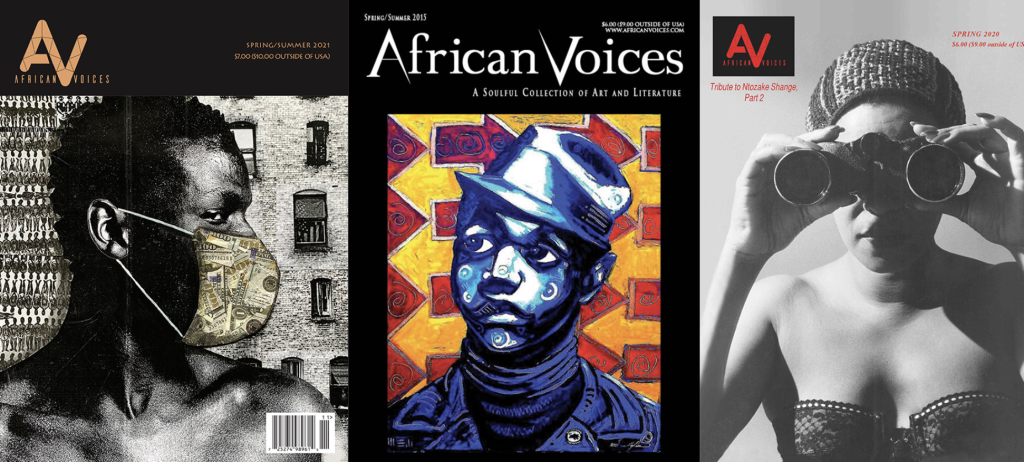We spoke with Carolyn A. Butts, executive director and publisher of African Voices Communications, in our latest Member Spotlight.
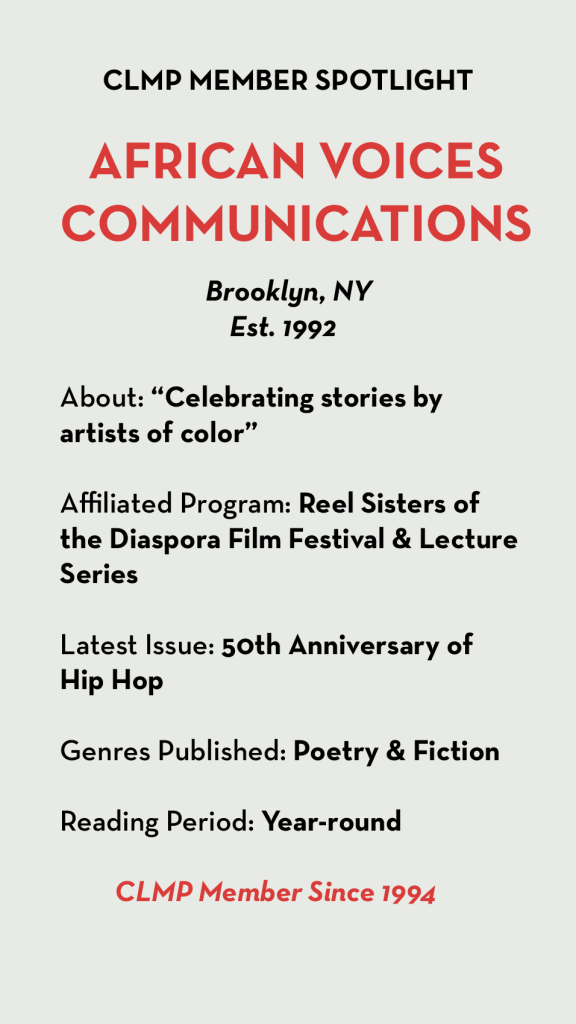 What is the history behind African Voices Communications? When was it founded and what is its mission?
What is the history behind African Voices Communications? When was it founded and what is its mission?
African Voices Communications, an arts organization dedicated to fostering cultural understanding, was founded in 1992 by a small group of writers and visual artists at a time when there were few outlets for Black and Latinx artists. As fledgling writers and artists, we understood that our voices were missing from the literary landscape and wanted to build an institution where emerging artists could make a personal connection with readers.
We spent that first year establishing African Voices Communications through poetry readings, creative writing workshops, and art exhibitions held in cafés and bookstores; we launched the magazine African Voices from a closet-sized office located across the street from the Fashion Institute of Technology (FIT) in Manhattan. We placed a small ad seeking writers in the New York Times and Village Voice and received over 500 submissions from Black writers and artists—far more than the 20 to 50 submissions we expected to get! To spread news about our forthcoming issue, we partnered with Imani House, Black Women in Publishing, and other local groups. The first issue of African Voices was published as a tabloid magazine in April 1993.
Our ongoing mission is to provide a home for storytellers of color to share their literature, art, and films with the world.
African Voices recently entered its fourth decade. Can you tell us more about the literary magazine today?
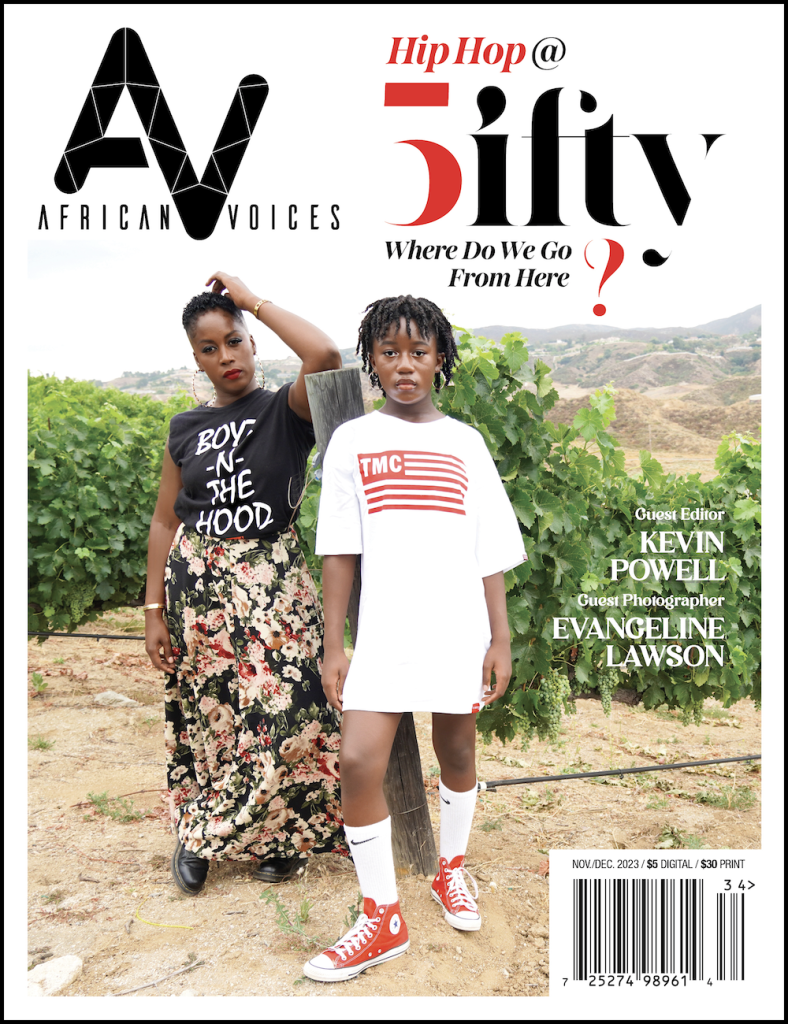 African Voices’ superpower is always finding a way to stay connected with our audience as time changes. Every few years we do a reboot—1992 is not 2024. Exploring new ways to communicate and create art for the time we are living in is vital to keeping the magazine fresh.
African Voices’ superpower is always finding a way to stay connected with our audience as time changes. Every few years we do a reboot—1992 is not 2024. Exploring new ways to communicate and create art for the time we are living in is vital to keeping the magazine fresh.
In December, we released a special, 92-page digital issue celebrating Hip Hop’s 50th anniversary, guest-edited by Kevin Powell. The issue, which features poetry, fiction, and essays by 63 intergenerational and diverse voices from four continents, represents a new chapter in our 32-year publishing history.
Going forward, we would love to feature short stories and art by writers under the age of 25 alongside work by established artists. In February 2024, we’re launching our membership drive to welcome a new generation into our publication and to make our continued work possible.
What are some of the programs that your membership program will fund? What does membership entail?
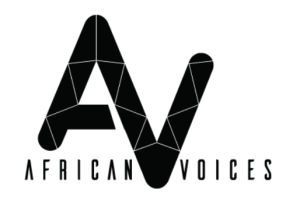 Our new membership program will be vital in helping us sustain the magazine and our artistic programs, and we’re hoping to raise $100,000 to match funds received through the National Endowment for the Arts’ American Rescue Plan. Funds from the campaign will help us keep our doors open to the community by supporting our creative writing workshops, reading and exhibition series, and the Spelman College archiving project.
Our new membership program will be vital in helping us sustain the magazine and our artistic programs, and we’re hoping to raise $100,000 to match funds received through the National Endowment for the Arts’ American Rescue Plan. Funds from the campaign will help us keep our doors open to the community by supporting our creative writing workshops, reading and exhibition series, and the Spelman College archiving project.
Membership levels run from $50 to more than $500, and members receive discounts to our workshops, special access to back issues, and tickets to our annual Reel Sisters of the Diaspora Film Festival & Lecture Series. We are planning a membership appreciation reception in the summer, where members will mingle with our editors, staff, and guest writers.
African Voices is grateful to have an amazing community of supporters already. A beautiful story about how important it is to literally stay “grounded” in the community you are serving: We moved from Manhattan to Brooklyn in 2019, and our new space had an unattractive concrete floor. We sent an e-blast asking for donations to pay for the installment of a floor, and within an hour, African Voices received a contribution from the Bayne family that covered the installation.
We’re confident that as long as the stories and art we share resonate with our readers, African Voices will continue to grow and thrive.
Spelman College acquired the African Voices archive in 2021. Can you tell us more about this acquisition and its significance?
Thanks to a grant from New York Community Trust, Spelman College is in the process of digitizing African Voices’ entire art collection, including the magazine. This acquisition is important because, due to lack of funds and resources, many Black publications and institutions fail to preserve their histories. Erasure comes in many forms. Our partnership gives future generations an opportunity to read and enjoy the work of the Toni Morrisons who did not make that breakthrough but whose works are just as vital in understanding that Black literature did not end with the Harlem Renaissance—we are part of a continuum.
African Voices will be available for scholars and young people to access online and physically at Spelman College. And, since Spelman College recently received a $100 million endowment contribution, one of the largest donations ever made to a HBCU, it is exciting to know that our publication is housed within an archive that may be around for another 200 years! We are also conducting an inventory of our back issues and will begin making them available to our subscribers and members.
You’re currently presenting an art show in a popup gallery in Brooklyn. What artwork is featured, and how can visitors attend the exhibition?
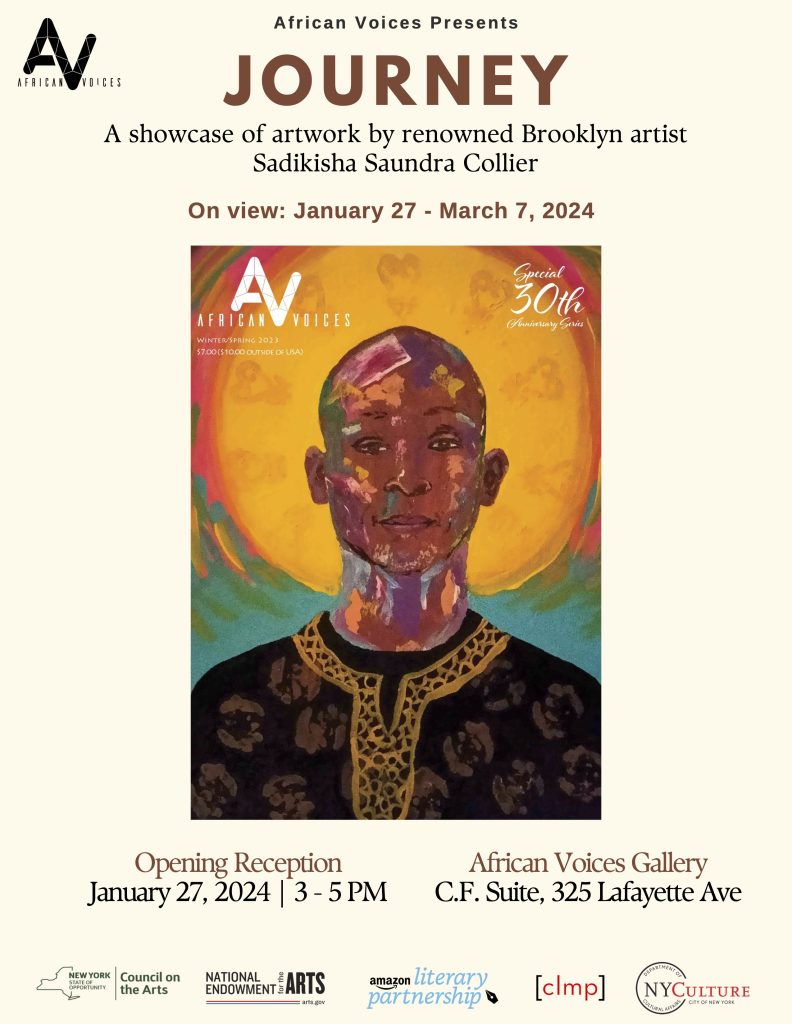 Our latest exhibition, titled Journey, opened on January 27, 2024, and features master artist and printmaker Sadikisha Saundra Collier, whose art also graces the front cover of African Voices’ Summer/Fall 2023 issue. Collier is a prolific artist who depicts joy in Black life and culture and whose work centers on family relationships and bonds. Journey celebrates her triumph over personal challenges, including her experience as a cancer survivor, and includes uplifting pieces such as Tea Party With Grandma (2022), Madonna and Child (2019), and a tribute to Harriet Tubman titled Black Moses (2023). Two of Collier’s pieces have already sold.
Our latest exhibition, titled Journey, opened on January 27, 2024, and features master artist and printmaker Sadikisha Saundra Collier, whose art also graces the front cover of African Voices’ Summer/Fall 2023 issue. Collier is a prolific artist who depicts joy in Black life and culture and whose work centers on family relationships and bonds. Journey celebrates her triumph over personal challenges, including her experience as a cancer survivor, and includes uplifting pieces such as Tea Party With Grandma (2022), Madonna and Child (2019), and a tribute to Harriet Tubman titled Black Moses (2023). Two of Collier’s pieces have already sold.
The exhibition runs through March 7, 2024, at the pop-up African Voices Gallery at 325 Lafayette Avenue in Brooklyn. Collier will give an artist talk at 4 p.m. on Saturday, March 2. Visitors are welcome on Tuesdays, Thursdays, and Fridays from 12 to 7 p.m.
How can interested writers submit their work to African Voices?
Writers can visit our Submittable page to learn more about submitting poetry and short fiction for upcoming print and online issues. We welcome simultaneous submissions and are excited to consider cutting-edge poetry, experimental literature, and excerpts from larger works. Diversity in style, genre, and community are priorities alongside literary excellence.
